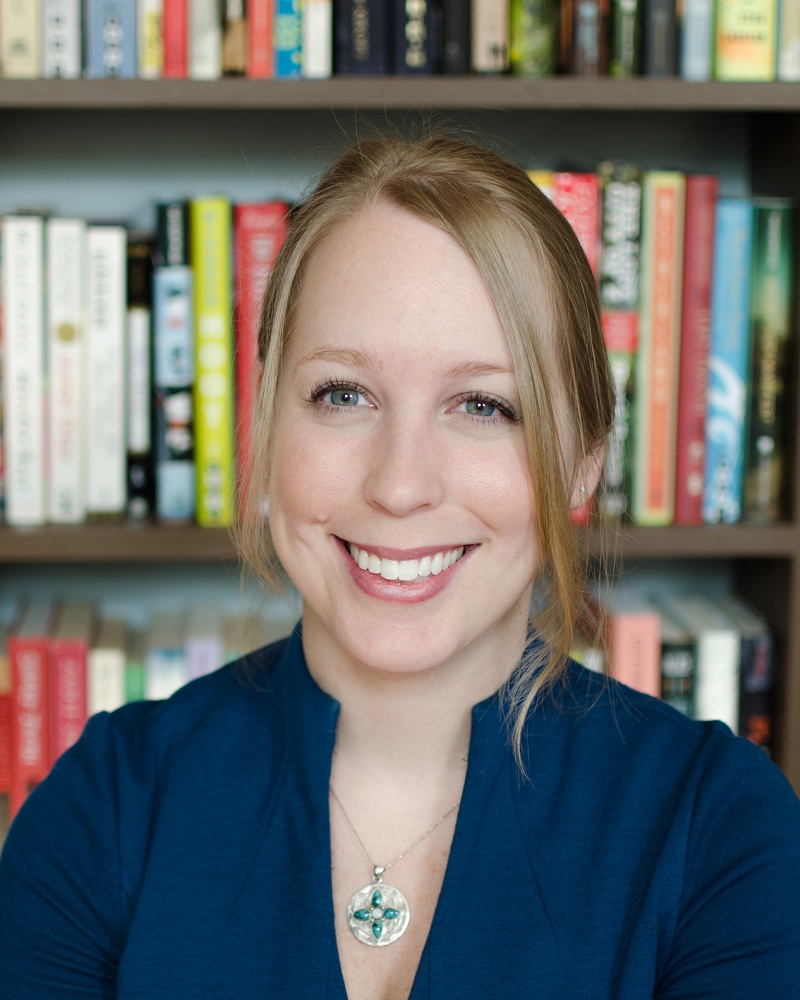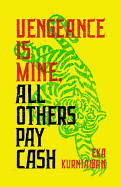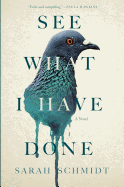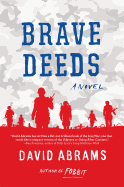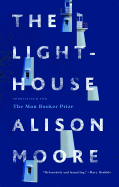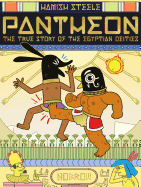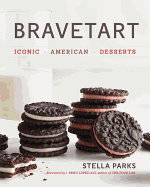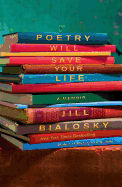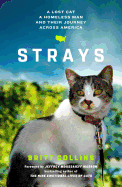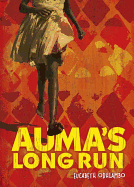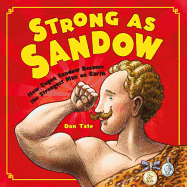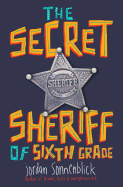All Over the Place
Several weeks ago, I was boarding a flight to San Francisco. Actually, my boyfriend and I were waiting to board. To be more specific, we were hunkered in an un-air conditioned corner of Sea-Tac airport with about a hundred other people after our plane was delayed due to the smog from wildfires burning in British Columbia. Children squirmed furiously. Their parents repeatedly volunteered toys as peace offerings. Vacationers complained loudly. Others compulsively checked their phones. The sound of weeping and gnashing teeth rose throughout the terminal.
 The delay jeopardized the dinner reservation we made at Bouche for our anniversary and, worst-case scenario, threatened to tank our entire getaway. Like a balm in Gilead, however, Geraldine DeRuiter's travel memoir All Over the Place (PublicAffairs, $26) held my anxiety at bay. Or at the very least, it offered enough schadenfreude to prevent me from turning into one of those furious toddlers. Instead of worrying about my travel problems, I had DeRuiter's to enjoy: the time she and her husband faced off with Air France after missing a flight to Paris, or when she hiked for hours through an Italian wilderness with a fever, or how she severely clogged an eco-friendly hotel toilet.
The delay jeopardized the dinner reservation we made at Bouche for our anniversary and, worst-case scenario, threatened to tank our entire getaway. Like a balm in Gilead, however, Geraldine DeRuiter's travel memoir All Over the Place (PublicAffairs, $26) held my anxiety at bay. Or at the very least, it offered enough schadenfreude to prevent me from turning into one of those furious toddlers. Instead of worrying about my travel problems, I had DeRuiter's to enjoy: the time she and her husband faced off with Air France after missing a flight to Paris, or when she hiked for hours through an Italian wilderness with a fever, or how she severely clogged an eco-friendly hotel toilet.
All Over the Place: Adventures in Travel, True Love, and Petty Theft isn't exactly travel advice. "This book isn't going to teach anyone how to travel," DeRuiter explains. "The only thing this book can do, if you read very closely and critically, is teach someone how not to travel." When you're neurotic and lack spatial reasoning (like me!), hopping on a plane can be a recipe for disaster. Thankfully, someone with more neuroses and fewer directional instincts has gone there before us, and had the good sense and snappy humor to write about it.
The upshot here is that my boyfriend and I made it to San Francisco and our anniversary was saved. Dinner was delicious. I had the steak. --Dave Wheeler, associate editor, Shelf Awareness
Worst Marriages in Literature
"Mind games, lies, attempted murder." Electric Lit investigated "11 of the worst marriages in literature."
---
Buzzfeed highlighted "17 movies that are cleverly disguised Shakespeare plays."
---
Quirk Books was just wondering "what that reaction would be if some of our favorite authors of classic American literature were to attend Burning Man 2017 [which is taking place now] when they were in their prime."
---
Ouch. In accordance with the late Terry Pratchett's wishes, a hard-drive containing his unfinished novels was crushed by a "vintage John Fowler & Co. steamroller named Lord Jericho at the Great Dorset Steam Fair," the Guardian reported. Pratchett, author of the widely-loved Discworld series, passed away in 2015 due to Alzheimer's disease.
---
Chronicle Books Blog offered tips on "how to start a Silent Book Club."
Worst Marriages in Literature
Book Review
Fiction
Vengeance Is Mine, All Others Pay Cash
by Eka Kurniawan, trans. by Annie Tucker
Vengeance Is Mine, All Others Pay Cash is Eka Kurniawan's bizarre follow-up to his critically acclaimed novels Beauty Is a Wound and Man Tiger. The Indonesian author has won international fans with his surreal, over-the-top style. With Vengeance Is Mine, All Others Pay Cash, Kurniawan leans into pulp storytelling in a short, hyperactive burst of literary energy.
The cheeky title sets the mood for a story that revolves around violence and sexual dysfunction, following Ajo Kawir, whose chief preoccupation is his inability to achieve an erection. Kawir refers to his penis as "the Bird," often speaking to it or musing on its quiescence: "the Bird thought it was a polar bear hibernating through a long frigid winter. It was dreaming of gently falling snow, which its master had never seen." The juxtaposition of prurient subject matter and a graceful, almost dreamy style typifies Kurniawan's writing as well as the novel's oddball sense of humor.
Which is not to say that Vengeance Is Mine, All Others Pay Cash is always a laugh riot: Kawir's dysfunction is caused by a brutal childhood trauma and inhibits his relations with women, especially his beloved Iteung. Kawir meets her while she's acting as a bodyguard for a man he wants to kill. After fighting each other to a bloody standstill, they begin a charming but ill-fated courtship. Kurniawan is fond of bouncing through time, letting present and past events mingle. The novel thrives by creating a chaotic momentum that will prove irresistible to readers. --Hank Stephenson, bookseller, Flyleaf Books, Chapel Hill, N.C.
Discover: This is Indonesian breakout author Eka Kurniawan's wry, maximalist take on toxic masculinity and the impulsive violence of youth.
New Directions,
$15.95,
paperback, 160p., 9780811225649
See What I Have Done
by Sarah Schmidt
"Someone's killed Father." On August 4, 1892, 32-year-old Lizzie Borden found her father dead and called for the family maid, Bridget, giving rise to one of the most notorious American crime legends. Despite more than a century of lore, there is no legal certainty Lizzie bludgeoned her father and stepmother to death. Sara Schmidt has re-imagined that infamous day in her wonderfully bonkers debut novel, See What I Have Done. Schmidt deftly weaves history into mystery, giving the mix an unusually ghoulish take that renders it both arresting and squirm-inducing.
It was no secret in Fall River, Mass., that the Bordens were a little peculiar. Lizzie and her older sister, Emma, still lived at home with their father and his second wife. The four were a compellingly toxic group of codependents, engaged in a constant tug-of-war between loving and hating, slapping and hugging, needing and repelling.
The majority of the novel takes place on the day before and day of the murders, from the perspectives of Lizzie, Emma and Bridget. Schmidt also includes Benjamin, an acquaintance of the girls' Uncle John, cleverly used to infuse both more mystery and credibility into the story. Although the narrative is boldly macabre, it's written with such a proper New England sensibility that even blood licking feels almost crazily quaint.
The Borden girls' minds are uncomfortable places to be--particularly Lizzie's, portrayed as fragmented and childlike yet sinister and calculating. Sprinkled with hatchet misadventures, potential poisonings and odd fascinations with pears and fingernail clippings, Schmidt's storytelling is mind-blowingly atmospheric and unsettling. --Lauren O'Brien of Malcolm Avenue Review
Discover: This fascinating and disturbing novel considers the mystery of whether Lizzie Borden gave her parents deadly whacks with an axe.
Atlantic Monthly Press,
$26,
hardcover, 324p., 9780802126597
Brave Deeds
by David Abrams
Brave Deeds by David Abrams (Fobbit) is the story of six American soldiers in Iraq, who steal a Humvee to drive across Baghdad to attend the officers-only funeral of their sergeant, killed by an IED. When the vehicle's drive shaft freezes an hour into their mission, they abandon the disabled vehicle, radio and maps to avoid a potential sitting-duck attack, and begin to hoof it to the funeral through unfamiliar streets amid Iraqi citizens.
In short chapters, Abrams fleshes out each of these unlikely comrades. As the favorite of the dead sergeant, Dmitri "Arrow" Arogapoulos steps up to take charge, but is as clueless as the others when it comes to navigating the city's dicey alleys and open-air markets. Cheever is an overweight whiner. Fish has a history of crime and violence back home. O hasn't gotten over losing his ex-wife. Park is a silent Korean American with overbearing parents. Drew is obsessed with the high school sweetheart who got away. Some are gung-ho for the war and "worship at the First Church of Bush." Others joined up for the money.
The men in Brave Deeds (and they're all men) crack funny, gripe at their buddies and, with reason, fear the unseen. With compact precision and the amusing patter of a sardonic narrator, Abrams captures the unusual histories of these ordinary men shuffling through Baghdad as they encounter the horrors of war. They may be AWOL on a personal mission outside command protocol, but they are heroes in their own ways and perform small brave deeds in the midst of half-baked chaos. --Bruce Jacobs, founding partner, Watermark Books & Cafe, Wichita, Kan.
Discover: Brave Deeds follows six AWOL U.S. soldiers in the treacherous streets of Baghdad.
Black Cat/Grove Press,
$16,
paperback, 256p., 9780802126863
Mystery & Thriller
The Lighthouse
by Alison Moore
Shortlisted for the Man Booker Prize, Alison Moore's The Lighthouse is both a thriller and an elegiac look at memory in the vein of W.G. Sebald's The Rings of Saturn. Following a newly divorced man as he goes on a walking tour of Germany, Moore's novel builds in tension as it plumbs what it means to be loved, and how the small traumas of youth can last throughout one's life.
The Lighthouse follows Futh (his first name is rarely, if ever, mentioned) on the walking tour, tracing a path along the Rhine that begins and ends at a hotel run by Ester and Bernard. An abusive and jealous husband, Bernard erroneously assumes Ester has had a fling with Futh, sending him into a rage that looms over the story. Futh, unaware of the trouble brewing at the hotel, is awash in memory as he walks. The Lighthouse alternates between chapters that focus on Futh and the growing tension between Ester and Bernard at the hotel, which he will walk right into upon his return. That tension generates more propulsion than is associated with Sebald's work, though they are equally dreamy and interested in memory.
Moore's triumph is that she manages to thread the needle, creating a haunting, elegiac book that is very hard to put down. Readers will most likely finish The Lighthouse quickly; its images will remain with them long after. --Noah Cruickshank, adult engagement manager, the Field Museum, Chicago, Ill.
Discover: The Lighthouse, shortlisted for the Man Booker Prize, is a haunting novel that manages to be both a stunning look at memory and a bona fide thriller.
Biblioasis,
$14.95,
paperback, 192p., 9781771961455
The Hole
by Hye-young Pyun, trans. by Sora Kim-Russell
By the time Hye-young Pyun's taut psychological thriller The Hole has tightened its grip on the unsuspecting mind, it's too late to escape. The shadows lurking in the novel become manifest, and dark poetic justice reigns.
It takes a maestro to create a short novel of such atmosphere and depth. Pyun is a rising star in contemporary Korean literature, known for her short stories. Sora Kim-Russell's excellent translation of The Hole finally brings Pyun's impressive novelistic talents to an English-speaking audience.
The novel is a deceptively simple story of loss and grief. Oghi, a South Korean professor of geography, awakes from a coma paralyzed, incapable of speech and terribly disfigured. His wife has perished in the same car crash that crippled him. With no other family, Oghi's forlorn mother-in-law becomes his sole caretaker. Pyun seamlessly switches from her characters' present situation to flashbacks. As secrets from Oghi's past gradually emerge, the relationship between Oghi and his mother-in-law thickens with unspoken tension.
The Hole is an exercise in subtlety. Pyun begins with slow-burning character studies of Oghi, his wife and their respective parents: their shortcomings and resentments, their arguments and power struggles. The novel's greatest symbol becomes the garden outside Oghi's townhouse, where his late wife tried to grow plants and flowers with little success. The only plants that survived were the climbing vines, "planting their roots wherever, willfully burrowing, gorging themselves." The Hole is an unshakable novel about the unfathomable depths of human need. --Scott Neuffer, freelance journalist, poet and fiction author
Discover: South Korean literary star Hye-young Pyun focuses on the desperate relationship between a crippled professor and his mother-in-law in this exquisitely crafted, slowly gripping psychological thriller.
Arcade Publishing,
$22.99,
hardcover, 208p., 9781628727807
Science Fiction & Fantasy
An Alchemy of Masques and Mirrors
by Curtis Craddock
In a vividly imagined debut, Curtis Craddock introduces the world of the Risen Kingdoms, where airships soar among floating island nations, sorcerers play deadly politics and a young princess and her gallant bodyguard must stand together for the sake of the future.
In l'Empire Céleste, a society ruled by powerful sorcerers, Princess Isabelle des Zephyrs's two distinguishing characteristics, in her father's opinion, are her lack of magic and her malformed hand. She finds joy in mathematics and the physical science of her world, especially the aether that gives islands and ships their lift, and she publishes scientific papers under the male pseudonym Martin DuJournal. No one takes any notice of her, except Jean-Claude, the king's musketeer, who pretends to be a drunken fool for the purposes of gathering information and remains her devoted protector and father figure. An international spotlight, however, suddenly focuses tightly on Isabelle when Artifex Kantelvar--a part-human, part-clockwork religious representative--asks her to marry Principe Julio, a prince of Aragoth, the neighboring kingdom, where Glasswalker sorcerers can step in and out of mirrors to travel from place to place.
Sprawling and immersive, Craddock's Risen Kingdoms world is a gorgeous blend of steampunk and sorcery that draws its flavor from 17th-century French and Spanish history. Practical, brainy and strong-willed, Isabelle is a refreshing heroine, and Jean-Claude makes for a lovable counterpart with his dogged bravery and sardonic wit. With a dramatis personae roll as long as a musket barrel and a complex political landscape, An Alchemy of Masques and Mirrors could easily serve as the first of a long and fascinating series. --Jaclyn Fulwood, blogger at Infinite Reads
Discover: In a world where nations float in the sky, a spirited princess and the musketeer who guards her must solve a mystery to avert a war.
Tor,
$25.99,
hardcover, 416p., 9780765389596
Graphic Books
Pantheon: The True Story of the Egyptian Deities
by Hamish Steele
Egyptian history is sordid and perversely fun in Hamish Steele's graphic novel Pantheon: The True Story of the Egyptian Deities.
Steele is a freelance animation director and illustrator from London who has worked for the BBC, Random House and Nickelodeon. Pantheon, though, is decidedly not for children. Readers are warned from the onset that it contains "incest, decapitation... and a golden willy," among other things. Adults with a dark sense of humor, on the other hand, may appreciate the cartoon gore and sex. In 12 chapters, Steele presents the deity myth of Horus and Set, who battle for the future of the Egyptian throne and, by extension, the fate of humanity. The gods' endless betrayals and reversals of fortune build to a glorious conclusion.
Those unfamiliar with the Osiris myth will find murdered patriarchs, familial treachery and sexual intrigue reminiscent of Sophocles, Shakespeare or the Old Testament. Steele takes the ancient source material and refreshes it with modern irreverence. His cartoons are colorful and lively, and his dialogue is ironic and hilarious without being bombastic. For example, when Ra and the celestial cow Nut are explaining the newly created afterlife for humans--"the bad ones will get eaten by a demon, and before that they'll have to go through several trials and face hundreds of snakes"--the trickster and usurper Set answers with characteristically playful humor: "Sounds hot."
Pantheon never takes itself too seriously, which makes its presentation of mythology all the more enjoyable. Readers may find Steele provides some genuine education in the process. --Scott Neuffer, writer, poet, editor of trampset
Discover: Animator Hamish Steele delivers an irreverent send-up of Egyptian gods in this witty and charmingly crude graphic novel.
Nobrow,
$22.95,
paperback, 216p., 9781910620205
Food & Wine
BraveTart: Iconic American Desserts
by Stella Parks
Stella Parks's eagerly awaited Bravetart: Iconic American Desserts offers a bounty of classic and fondly remembered desserts that can be replicated at home. Parks, senior editor at Serious Eats, develops recipes that, as J. Kenji Lopez-Alt of Food Lab writes in his enthusiastic introduction, "strike a balance between comfort and quality."
BraveTart was the nickname for a collaboration Parks had with a friend, which turned into a successful food and writing blog. She developed the cookbook out of the blog with the goal of creating a repository and history of these distinctly American recipes.
BraveTart collects more than 75 recipes, along with color photography from Penny De Los Santos and vintage advertisements, in three main sections: classic American desserts, brands (such as homemade Fig Newtons) and ice cream. While the ingredient lists may seem lengthy, Parks is known for making every element of her desserts by hand. True to form, she includes recipes for such things as chocolate sprinkles and homemade Heath toffee bits so that home bakers can try their hand at these iconic flourishes as well. Parks has strong opinions on a few elements: weighing ingredients, for example, is something she stresses--but she also encourages bakers to "mix it up" and try variations at home.
Stella Parks offers a master lesson in baking techniques and a lively guide to some little known food history. --Cindy Pauldine, bookseller, the river's end bookstore, Oswego, N.Y.
Discover: Bravetart: Iconic American Desserts gives home bakers the science behind classic confections and the techniques to re-create iconic desserts at home.
W.W. Norton,
$35,
hardcover, 400p., 9780393239867
Biography & Memoir
Poetry Will Save Your Life
by Jill Bialosky
"It is this mystic negotiation of the knowing and unknowing, that flicker of light in a dark wood that is poetry," writes Jill Bialosky (History of a Suicide) in Poetry Will Save Your Life. Poet and novelist Bialosky fans that flame in this unconventional book that is at once poetry anthology and personal reckoning. She intertwines poems that have shaped her with the contexts in which they mattered; the bones of poetry and flesh of reflection yield something extraordinary.
Bialosky's stories swing a poignant pendulum from past to present. The loss of her father leads her to seek comfort in poems, sparking a lifelong passion for the form. Between the included poems, she meditates on moments that deal with the minutiae of life--a stolen tube of lipstick or a chance meeting with boys in a blue Corvette--as well as moments of magnitude: the miscarriage of a child or picking up her young son from his Manhattan school on the morning of September 11.
Emily Dickinson, Robert Frost, Sylvia Plath and Adrienne Rich are among more than 40 poets whose work Bialosky gathers, along with scholars' and critics' commentary. Her writing is itself poetic: careful, courageous and clear. She marvels at the power of poems that can punctuate life, poems that "shimmy down the page" or that, in Frost's words, become "a way of taking life by the throat." Ultimately, Poetry Will Save Your Life does all three. --Katie Weed, freelance writer and reviewer
Discover: Jill Bialosky composes an unforgettable patchwork of poems and prose in this distinctive memoir.
Atria,
$24,
hardcover, 240p., 9781451693201
Pets
Strays: A Lost Cat, a Homeless Man, and Their Journey Across America
by Britt Collins
Michael King's foster father, Walter, told a teenage Michael, "Anyone who's on the down-and-out heals himself with animals." Several decades later, Michael experiences that sentiment first hand when an injured, scrawny cat chances upon the homeless alcoholic and turns his world on its head.
British journalist and animal advocate Britt Collins compassionately tells Michael's story, taking readers through his rough childhood in Missouri to a devastating loss as a young adult that crushes his spirit and sends him in a downward spiral. A veteran of the streets in 2012, Michael is panhandling in Portland, Ore., when he meets the scared, helpless cat he names Tabor. Unable to find an owner, Michael continues to feed and care for the little feline. As Collins explains, "The homeless [have] a code of ethics--they always [take] care of their animals first." A bond between the two develops in no time.
When Michael travels south for the winter, Tabor--complete with collar and leash--goes as well. Their adventures take them camping, hitchhiking, to the ocean and face-to-face with a bear. Through it all, Michael's soul begins to heal. However, fate pulls the rug out from under Michael once again when he takes Tabor to the vet and discovers she's micro-chipped and has an owner looking for her.
This tender story of a damaged man who begins to heal and rediscover himself through the love of a cat is endearing and beautiful. Collins's astute understanding of the power of companion bonds makes Strays rich with emotion and charmingly satisfying. --Jen Forbus, freelancer
Discover: When a depressed, alcoholic, homeless man takes in a stray cat, their year of adventures forever change his life.
Atria,
$24,
hardcover, 272p., 9781501122590
Children's & Young Adult
Auma's Long Run
by Eucabeth Odhiambo
Auma, a rural Kenyan teenager in the years when HIV/AIDS became a national plague, is a strong runner and excellent student who desperately wants to become a doctor. But when both of her parents get sick and die, her plan to achieve her dreams is derailed; as eldest, she acts as caretaker to her dying parents, then (after their deaths), to her three siblings. She thinks, "the three of them were depending on me to make their dreams a reality.... As frightened as I might be, I was determined not to fail."
Auma shows great maturity, first dealing with her father's death from HIV/AIDS and then caring for her mother, who contracted the disease from her husband. Somehow, Auma is able to graduate from grade eight, win track meets and do all the chores necessary in her rural household, but she constantly questions her situation. A natural student, Auma is inquisitive about the illness that killed her parents, and learns more about it, discovering truths that the adults in her community will not acknowledge.
Driven Auma earns a high school scholarship, but after one year, she makes the tough decision to drop out, so that she can work in Nairobi and earn money to support her family. Readers will find themselves aligning with Auma as she hopes she will eventually return to school. In prose as forthright as Auma herself, Eucabeth Odhiambo tells a story of resilience and strength. Odhiambo, who grew up in Kenya in the '80s and '90s, saw the effects of the disease first hand; this experience plus her work with HIV/AIDs orphans helps her give life to the authentic and realistic character of Auma--a young woman to believe in--and to put a human face on the epidemic that still affects Kenya. --Melinda Greenblatt, freelance book reviewer
Discover: Auma's life in a Kenyan village is radically changed when her parents die from HIV/AIDS, but the teenager proves to be a formidable force when it comes to keeping her family together.
Carolrhoda Books,
$17.99,
hardcover, 304p., ages 11-14, 9781512427844
Strong as Sandow: How Eugen Sandow Became the Strongest Man on Earth
by Don Tate
Friedrich Wilhelm Müller loved athletics as a boy but "playing sports required a strong, healthy body" and Friedrich was skinny and frail. Though he was often "too sick to play," he remained undaunted by his physical restrictions and played sports, determined to be a healthy and strong person. As Friedrich grew older, his love of athletics never dimmed. Though his father wanted him to attend university and focus on a career, Friedrich could not ignore his drive to be active--he decided to join the circus.
When circus life didn't work out for Friedrich, his journey toward being "the strongest man in the world" began in earnest. He trained as a bodybuilder, changed his name to Eugen Sandow and soon became a professional strongman. With time, work and some (possibly slippery) performance tricks, Eugen gained world fame and launched the first organized bodybuilding contest, ever-so-humbly awarding the winner a statue of himself. Eugen Sandow's exercise and diet regimens are used to this day and the prize for the Mr. Olympia bodybuilding competition is still the (slightly updated) Sandow.
Don Tate (Whoosh! Lonnie Johnson's Super-Soaking Stream of Inventions), who used to be a bodybuilder himself, treats the exceptional life of Eugen Sandow with appreciation and respect while making sure to note in the ample back matter that much of what people today know about Sandow came from the man himself--a man who constantly sought perfection and sometimes stretched the truth. Tate's biography of one of the first international sports stars is welcoming to the young reader with approachable text and rich digital illustrations. And, for the budding athlete, there is even a page that teaches different strength building exercises. --Siân Gaetano, children's and YA editor, Shelf Awareness
Discover: Don Tate's Strong as Sandow is an honest and entertaining biography of Friedrich Wilhelm Müller/Eugen Sandow, a man once considered "the most perfect male specimen alive."
Charlesbridge,
$17.99,
hardcover, 40p., ages 6-9, 9781580896283
The Secret Sheriff of Sixth Grade
by Jordan Sonnenblick
Eleven-year-old Maverick Falconer wants to be like Spider-Man or Captain America. Instead, he's more like Don Rickles: funny and short--"but not short enough for the shortness to qualify as a superpower." Maverick's circumstances support the theory that every comedian's humor masks heartache: when he was three, Maverick's military firefighter dad died a hero in Afghanistan. His erratically employed, hard-drinking mother has an abusive boyfriend, and being woefully small for his age means Maverick can't protect her, plus he's ripe for ribbing from his peers.
On the verge of starting sixth grade, Maverick hatches a spirits-buoying plan: "I was going to do good deeds, right wrongs, stand up against evil, and protect anybody who was smaller or weaker than I was.... Assuming I could find anybody smaller or weaker than I was." He gets off to a lousy start: one of his "good deeds" is hanging an air freshener in his homeroom that gives his teacher hives, and he lands in the assistant principal's office more often than a hero should.
The Secret Sheriff of Sixth Grade is a comic novel that lets the reader look past the jokes and at Maverick's tattered sneakers, and into his empty cupboards. Jordan Sonnenblick (Curveball: The Year I Lost My Grip) has created a memorably endearing and unlikely hero whose biggest challenge is fighting not bad guys but the embarrassment of being poor and the compulsion to see one's parents as virtuous. --Nell Beram, freelance writer and YA author
Discover: What 11-year-old hero wannabe Maverick Falconer lacks in stature and strength he makes up for in tenacity and wit.
Scholastic Press,
$16.99,
hardcover, 208p., ages 10-14, 9780545863209
 The delay jeopardized the dinner reservation we made at Bouche for our anniversary and, worst-case scenario, threatened to tank our entire getaway. Like a balm in Gilead, however, Geraldine DeRuiter's travel memoir All Over the Place (PublicAffairs, $26) held my anxiety at bay. Or at the very least, it offered enough schadenfreude to prevent me from turning into one of those furious toddlers. Instead of worrying about my travel problems, I had DeRuiter's to enjoy: the time she and her husband faced off with Air France after missing a flight to Paris, or when she hiked for hours through an Italian wilderness with a fever, or how she severely clogged an eco-friendly hotel toilet.
The delay jeopardized the dinner reservation we made at Bouche for our anniversary and, worst-case scenario, threatened to tank our entire getaway. Like a balm in Gilead, however, Geraldine DeRuiter's travel memoir All Over the Place (PublicAffairs, $26) held my anxiety at bay. Or at the very least, it offered enough schadenfreude to prevent me from turning into one of those furious toddlers. Instead of worrying about my travel problems, I had DeRuiter's to enjoy: the time she and her husband faced off with Air France after missing a flight to Paris, or when she hiked for hours through an Italian wilderness with a fever, or how she severely clogged an eco-friendly hotel toilet.



